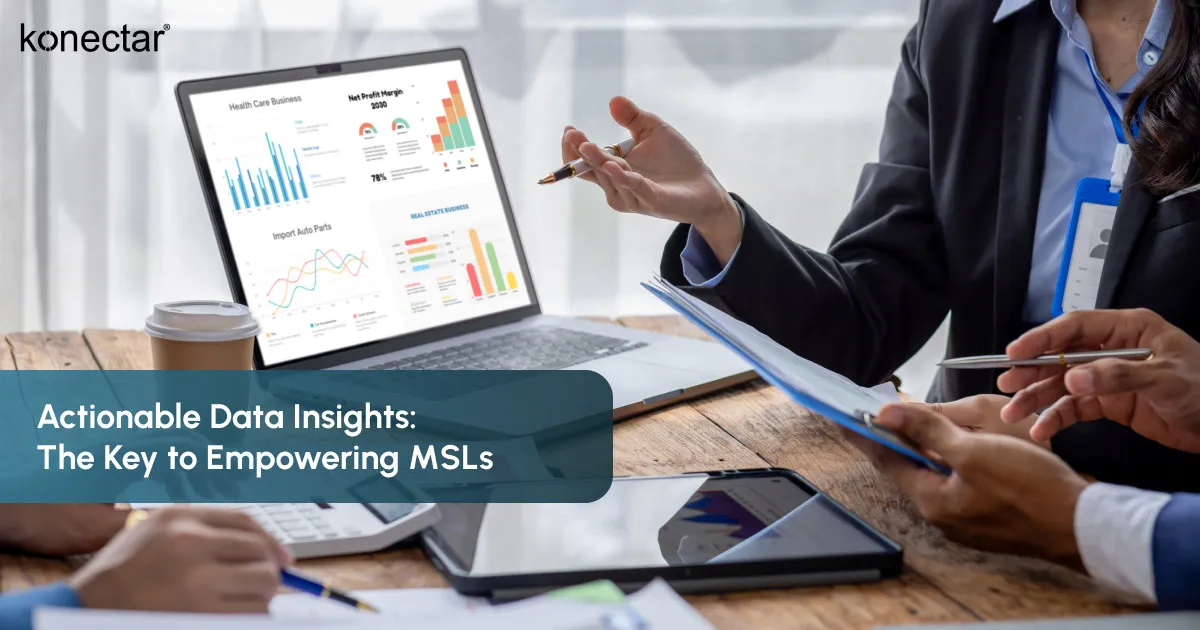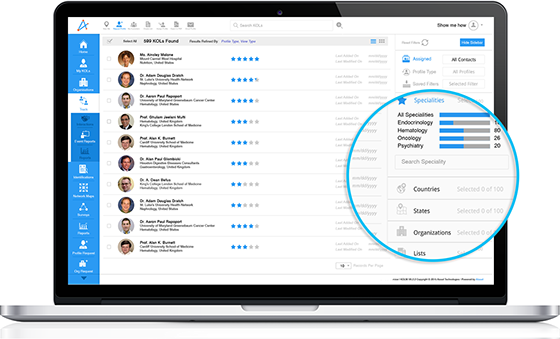18-12-2024
Actionable Data Insights: The Key to Empowering MSLs

MSLs are the backbone of scientific engagement in the pharmaceutical industry. However, to succeed in the competitive healthcare industry today, MSLs need more than just expertise—they require access to some actionable healthcare data analytics. This will enable them to make evidence-based decisions and drive impactful scientific communication. Leveraging data analytics has become essential to optimizing MSL performance and achieving superior outcomes.
In this article:
Why MSLs Need Actionable Data Now More Than Ever
The healthcare industry has become highly data-driven, with constant streams of information from clinical trials, market trends, competitor activities and patient healthcare outcomes. MSLs must sift through this data to extract insights to drive their strategic engagements with healthcare professionals (HCPs) and commercial objectives
Much like field sales reps, MSLs work in environments where decisions need to be based on real-time information. In the field of sales, technology has revolutionized the way sales reps approach their tasks. Similarly, MSLs in the healthcare industry must also leverage the power of data science and analytics to optimize their strategies, understand their target audience, and drive business success.
What’s the Big Deal with Actionable Data?
Actionable data is quickly transforming the way organizations make decisions. The key lies in how data is processed, interpreted, and applied to support real-time decision-making, rather than merely being collected, stored and applied.
Actionable data goes beyond raw statistics or broad trends—it is relevant, timely, and tailored to address specific business needs or challenges. For MSLs, this means having access to data that not only highlights emerging medical insights and scientific developments but also provides the ability to segment HCPs based on various factors including their prescribing patterns, therapeutic areas of interest, and the likelihood of engagement.
In practice, this means MSLs can leverage insights from various data analytics in pharmaceutical industry sources, such as clinical trials, publications, digital interactions, EHRs, and KOL influence, to inform their scientific discussions. For example, if a specific HCP is showing interest in a particular therapy, MSLs can access data on that therapy’s latest clinical findings, patient outcomes, or real-world evidence for a more impactful conversation.
Actionable data also creates a feedback loop that enhances both short-term and long-term engagement strategies. By using data analysis techniques to understand HCP preferences and engagement patterns, organizations can refine their approaches and continuously improve the quality of interactions.
Data Goldmines: Where Do MSLs Get the Best Insights?
MSLs rely on an array of data sources to gather critical insights that drive their interactions with HCPs. Below are some key data sources, including both traditional and emerging tools, that provide MSLs with valuable intelligence.
1. Clinical Trial Data
Clinical trial data remains one of the most authoritative sources for MSLs. With this data, they can assess the efficacy and safety of new therapies, identify potential risks, and engage HCPs with up-to-date scientific information. Trial outcomes, meta-analyses, and phase IV studies enable MSLs to better communicate the real-world application of therapies.
2. Peer-Reviewed Journals and Publications
Peer-reviewed literature is an essential tool for MSLs to stay abreast of the latest research in their therapeutic areas. Published papers, reviews, and guidelines provide scientifically credible evidence that forms the foundation of MSL-HCP discussions. By evaluating these publications, MSLs can ensure that they offer evidence-based recommendations that align with the latest medical standards and practices.
3. KOL and HCP Feedback
Direct feedback from KOLs helps MSLs understand clinical challenges, emerging treatment trends, and areas where further education is required. This feedback empowers MSLs to refine their strategies and ensure that their interactions with HCPs are both relevant and impactful.
4. Real-World Evidence (RWE)
Real-World Evidence (RWE) is increasingly used by MSLs to understand how therapies perform outside of controlled clinical trial environments. Data derived from patient registries, observational studies, insurance claims, and longitudinal data gives MSLs a more comprehensive understanding of how treatments perform in diverse, broader patient populations.
5. Electronic Health Records (EHRs)
EHRs are a goldmine of patient data that provide insights into treatment patterns, patient outcomes, and disease progression. By analyzing anonymized EHR data (with patients’ consent), MSLs can gain a deeper understanding of how therapies are being used in real-world clinical settings and track patient adherence.
6. Social Media and Digital Platforms
Social media platforms, medical forums, and healthcare-specific digital networks provide real-time insights into ongoing discussions among HCPs, researchers, and patients. MSLs can track these conversations to understand public sentiment, identify emerging healthcare topics, and discover new influencers in the field.
7. Internal CRM and Customer Interaction Data
CRM platforms store valuable information about past communications, engagement history, and feedback, allowing MSLs to build a detailed profile of each HCP. By analyzing this data, MSLs can develop future interactions, ensuring that their communications are personalized and aligned with HCPs' interests and needs.
8. Market Research and Competitive Intelligence
Market research reports, competitive intelligence tools, and market access data help MSLs understand the broader healthcare ecosystem. These sources provide insights into competitive landscapes, pricing strategies, market trends, and regulatory shifts that affect treatment decisions.
9. Patient-Reported Outcomes (PROs) and Surveys
Patient-reported outcomes (PROs) are vital in understanding the real-life impact of treatments from the patient’s perspective. By analyzing surveys, questionnaires, and direct feedback from patients, MSLs gain a deeper understanding of patient satisfaction, quality of life, and treatment preferences. This data is particularly valuable when discussing patient-centric care with HCPs.
konectar: An All-In-One Platform for Actionable Insights
Instead of navigating through multiple platforms, MSLs can leverage data analytics software tools to access a wide range of data—from HCPs’ professional activities, their ranking and tiers, social media feeds, industry engagements, sentiment, and more. konectar, an AI-powered platform, provides MSLs with a unified solution that integrates critical insights into one accessible interface.
Request a demo of konectar today to see how our platform can support your goals and decision-making process.
Final Thoughts
Today, MSLs shouldn't just rely on their knowledge of the role; they should be able to effectively apply that knowledge to drive meaningful change. When time is crucial, it becomes even more important to make decisions quickly, accurately, and with confidence. And key here lies in access to actionable data that empowers MSLs to engage with healthcare professionals in effectively.
FAQs
- What tools can help MSLs stay organized and efficient in their work?
MSLs can benefit from CRM systems, social media insights, clinical trial results, and digital engagement data. AI-powered tools, like konectar, can streamline these processes and help MSLs save time by providing a comprehensive view of key data in one place.
-
How can MSLs make the most out of data analytics?
MSLs need to leverage tools that provide real-time, actionable insights, not just raw data. By using advanced analytics to identify emerging trends, monitor HCP engagement, and assess treatment patterns, MSLs can make more informed decisions.
-
Why is real-time access to data important for MSLs?
Real-time access to data allows MSLs to stay relevant in their interactions with healthcare professionals. With up-to-date insights, they can address the latest scientific findings and emerging treatment options. This helps to enhance the quality of their discussions and strengthen professional relationships.
-
What should MSLs look for when selecting an HCP Management platform to gain insights on the healthcare landscape?
MSLs should consider tools that provide comprehensive, real-time data analysis, user-friendly interfaces, and the ability to integrate data from multiple sources. The platform should also offer predictive analytics and personalization options to help MSLs make decisions quickly.





